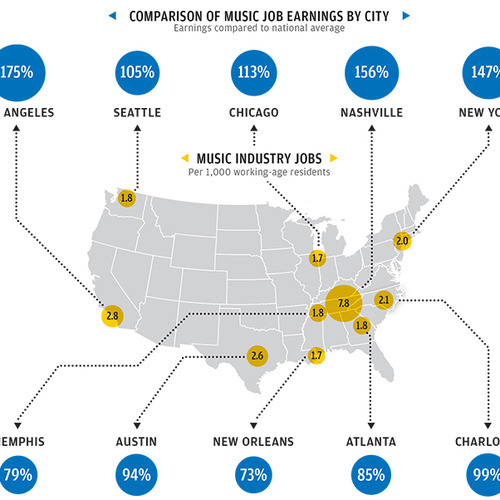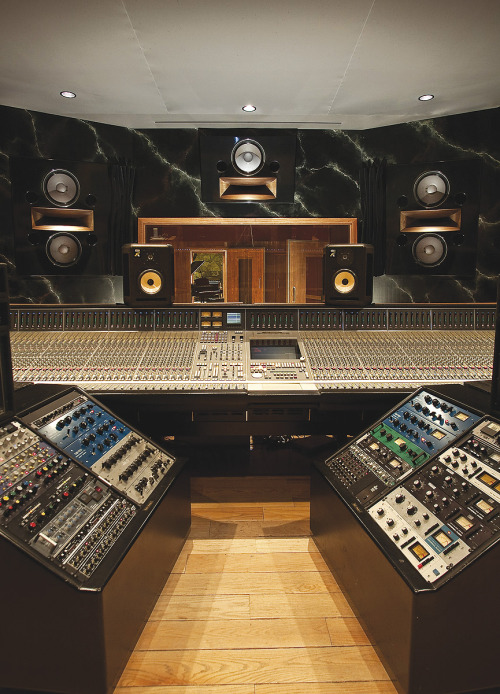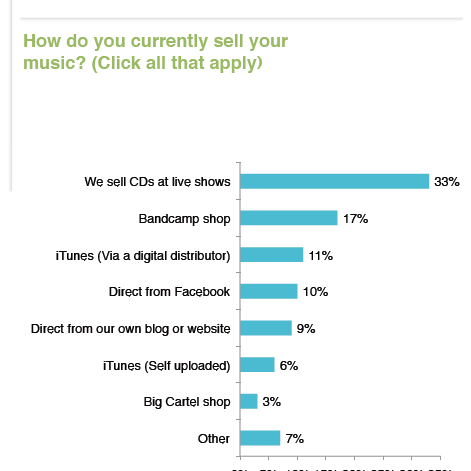The Official Funky Management Blog Based in the Washington, DC Metropolitan area, we are an artist management and representation company dedicated to discovering, developing and delivering exceptional talent to the world.
407 posts
Big Cities Like New York And Los Angeles Have More Music Industry Jobs, But You're More Likely To Have
Big cities like New York and Los Angeles have more music industry jobs, but you're more likely to have a neighbor in the biz in Nashville.
In today's DIY music business, people can perform their jobs from just about anywhere. But as economist Richard Florida pointed out in 2009, the trend in music industry jobs has been increased concentration in a small number of cities. From 1970 to 2006, Nashville was the only city in the country with positive growth in music industry jobs using a location quotient, a measure of a particular industry's share of the total employment in a given location. "In effect, it sucked up all the growth in the music industry," Florida wrote.
Nashville's 27,000 music industry jobs are vital to the city. The jobs earn an income of nearly $1.7 billion and contribute $5.5 billion to the local economy. The multiplier effect means one job can help support additional jobs. In all, the local music industry supports 57,000 jobs and creates a total economic output of $9.7 billion.
None of this has gone unnoticed by the City of Nashville. A report by the Nashville Area Chamber of Commerce and the Music City Music Council, a group of professionals assembled by Nashville Mayor Karl Dean, boasts of music's great impact on Nashville and the resources available in the modestly sized metropolitan area of 1.7 million. Using economic data compiled by Economic Modeling Specialty International, the report shows how Nashville stacks up to other music hubs.
In terms of concentration of music industry jobs, Nashville is tops with 7.8 per 1,000 residents, according to EMSI data in the report. Los Angeles is a distant second with 2.8. Austin is third with 2.6. At 2.0, New York actually falls beneath the 2.1 of Charlotte, N.C.
It should come as no surprise that the cities with the three highest concentrations of music industry jobs also have the best-paying ones. Los Angeles tops all markets in average music job earnings with 175% of the country's average salary. Nashville is second at 156%, and New York is third at 147%. Music jobs pay less than the national average in Charlotte (99%), Austin (94%), Atlanta (85%), Memphis (79%) and New Orleans (73%).
Those good salaries go far in Nashville. The city's cost of living is 11.1% lower than the national average, according to the ACCRA Cost of Living Index. New York is 125% of the national average. Los Angeles is 31% above it.
More Posts from Funkymgmt-blog-blog
Back in June Right Chord Music launched The Big Survey in association with Farida Guitars. Our aim was to better understand the realities of being a musician in 2013. The online survey was completed by 200 musicians, of which three-quarters were unsigned or independent. Two-thirds of the respondents reported they had released at least one single. The vast majority of respondents came from three countries: UK, Australia, and the USA.
Results highlight the increasing number of sites and services used by artists to promote their music. It’s no surprise that Facebook dominates, but it’s interesting to see the growing importance of Soundcloud and Bandcamp and the much heralded fall from grace of Myspace.
Just over one-half of the respondents reported paid live shows were the primary source of their monthly income. Digital download sales (13%) and CD sales (12%) were second and third respectively. Over six different incomes streams were reported. Although average incomes from live shows were not captured in this survey Right Chord Music would expect income from live shows at this level to be between £20-£50 per show, and a band to be playing a maximum of three paid shows within an average month. It’s clear once income is divided up between 3-4 band members and petrol, parking, hire, and rehearsal costs are factored in, income does not necessarily mean profit.
Bedroom and DIY culture is very much alive and kicking, with just under one-half (49%) of respondents reporting they record all of their music at home. Twenty-eight percent (28%) reported they record demos at home before heading to a professional studio to add a professional touch to their work.
To professionally promote music costs money, Right Chord Music estimates between £300-500 for online PR, and £600-£850 for radio plugging for a minimum of two months. Then there is press and TV, the cost continues to rise. Based on these costs, and their unsigned status, it is no surprise that the vast majority (87%) of respondents in this survey reported they have to promote their music themselves.
Respondents reported over seven different ways they sell their music, with selling CDs at live shows remaining the most popular sales channel. Bandcamp’s growing influence among the unsigned community is clear with as many respondents reporting they use Bandcamp as iTunes to sell their music. Ten percent (10%) of respondents reported they sell their music directly from Facebook.
When respondents were asked to highlight the biggest challenges they face as musicians two dominated: ‘Getting our music heard’ and ‘Making enough money.’ But equally noticeable is the large number of challenges they recognise and struggle to overcome. It is certainly not easy to be a musician in 2013.
To download your FREE copy of the full report visit: http://www.rightchordmusic.co.uk/faridaguitarresults





